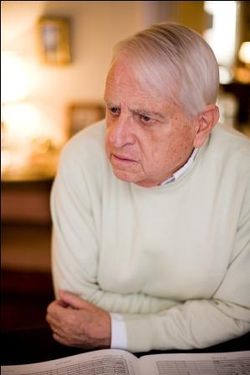Difference between revisions of "Halffter, Cristóbal"
| Line 45: | Line 45: | ||
[[Category:Percussion Duo]] | [[Category:Percussion Duo]] | ||
[[Category:Percussion (2)]] | [[Category:Percussion (2)]] | ||
| − | [[Category:Percussion | + | [[Category:Percussion Quartet]] |
| − | [[Category:Percussion ( | + | [[Category:Percussion (4)]] |
[[Category:Voice]] | [[Category:Voice]] | ||
[[Category:with Tape]] | [[Category:with Tape]] | ||
<!-- Don't forget to add categories, literature, instruments, history, pedagogy, sticks, etc. Also delete the Template category. To see what categories are available, see: http://www.tekpercussion.com/Special:Categories --> | <!-- Don't forget to add categories, literature, instruments, history, pedagogy, sticks, etc. Also delete the Template category. To see what categories are available, see: http://www.tekpercussion.com/Special:Categories --> | ||
Latest revision as of 16:24, 10 July 2018
Biography
Born: March 24, 1930
Country: Madrid, Spain
Studies: Madrid Real Conservatorio de Música (1951)
Teachers: Conrado del Campo
In 1936, Halffter's family moved to Velbert, Germany, to escape the Spanish Civil War, but they returned to Madrid in 1939, and Halftter studied with Conrado del Campo at the Madrid Royal Conservatory, graduating in 1951 (Alonso 2001). Outside of his university education, he studied with Alexandre Tansman and André Jolivet. In 1955, he was appointed conductor of the Falla orchestra. He forged a successful career as composer and conductor, writing music which combined a traditional Spanish element with avant-garde techniques. His Piano Concerto won the National Music Prize in 1953.[citation needed] In 1961 he became Professor of Composition at the Royal Conservatory of Madrid, where he became Director in 1964 but remained only until 1966 (Kennedy 2006). Among his notable pupils are Jean-Luc Darbellay, David Philip Hefti, and Javier Jacinto.
He was awarded Spain's highest award for composition, the Premio Nacional de Música, in 1989.
Halffter's works include the opera Don Quijote (2000) (Robés, Halffter, Amorós, and Cervantes 2004). His second opera, Lazarus, was premiered in 2008 at the Kiel Opera House to celebrate its centenary (Reininghaus 2008).[1]
Cristóbal Halffter is regarded as the most important Spanish composer of his generation (Alonso 2001).
Works for Percussion
Espejos - Percussion Quartet; with Tape
Noche Pasiva Del Sentido - Percussion Duo; Voice
References
- ↑ Cristóbal Halffter Bio - Wikipedia Retrieved 06/10/2012
